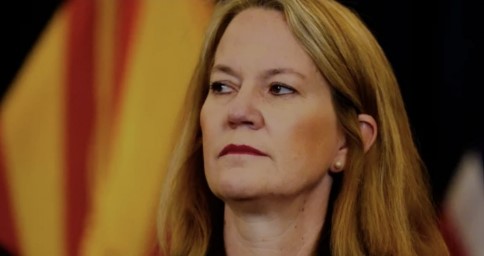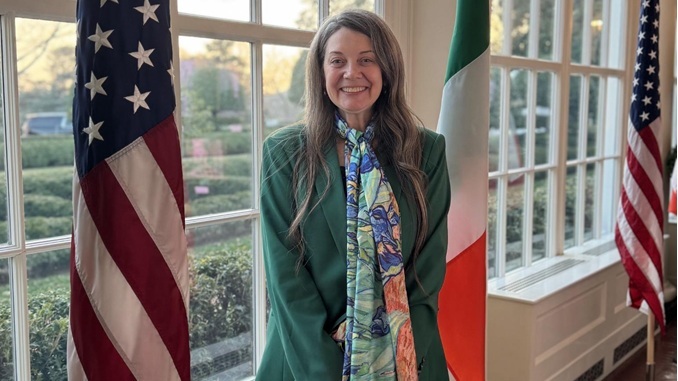
by Staff Reporter | Oct 22, 2025 | News
By Staff Reporter |
It pays to know the guys making the laws from the highest offices in the land.
Senator Ruben Gallego used his voting power to protect the business interests of a longtime friend — fellow Harvard University graduate and prominent Democratic donor and activist Joe Sanberg — interests which would turn out to be fraudulent.
In August, Sanberg pleaded guilty to two counts of wire fraud perpetrated through his online financial services company, Aspiration Partners. Sanberg admitted to defrauding over $248 million.
Senator Ruben Gallego fought for the success of Sanberg’s company while in Congress.
When he was still a congressman in 2023, Gallego voted to protect against environmental, social, and governance (ESG) limitations that would have impacted Aspiration Partners. The financial services company was uniquely focused on progressive environmental and social causes, including investing in fossil fuel alternatives and selling carbon credits.
Months before that vote, Sanberg gave Gallego a positive endorsement in The Hill. FEC records show Sanberg donated just over $13,000 to Gallego’s campaign from 2014 to 2017.
“The thing about Ruben is he knows exactly who he is,” said Sanberg. “This campaign isn’t about any individual personality.”
In 2015, the two men also launched a political action committee to help elect progressive Latino candidates — LLEGO-PAC, short for Latino Leaders for Equality, Growth, Opportunity, Progressive Action and Change.
Gallego praised Sanberg as “a thought leader” and “progressive leader from day one,” and credited the financial services CEO for being the one who “recruited” him into the Democratic Party. The senator was even a part of Sanberg’s wedding in 2021, per social media posts reported on by Fox News.
“He convinced me to get more involved in politics, and has been a good guiding post for me since then,” said Gallego.
Just a few years ago, Sanberg was shopping himself around to the media as a potential Democratic candidate for president. The Atlantic published one such feature of Sanberg in 2019.
In 2021, Aspiration disclosed in its annual Securities and Exchange Commission filing that 70 percent of its revenue came from ESG services.
Senator Gallego began banking with Aspiration in 2017 and then acquired a non-public stock in the company in 2019.
However, Gallego failed to report that purchase for three years, per Fox News reporting.
Aspiration came on the progressive venture capital scene in 2013 as an “environmental” bank with a “conscience,” the brainchild of co-founders Sanberg and Andrei Cherny, the latter Arizona’s former Democratic Party chairman, congressional candidate, and a Clinton administration speechwriter.
Cherny left Aspiration in mid-October 2022, two years after Sanberg later admitted to prosecutors the company turned fraudulent.
In 2021, Sanberg went into talks with the Los Angeles Clippers basketball team about a four-year, $48 million endorsement deal to sponsor one of their players, Kawhi Leonard.
Many have come to view the endorsement deal as a workaround to the NBA salary cap — a view bolstered by comments from those within Aspiration — though the Clippers have denied this speculation.
Following Sanberg’s arrest and pleading, Aspiration rebranded as GreenFi.
AZ Free News is your #1 source for Arizona news and politics. You can send us news tips using this link.

by Jonathan Eberle | Oct 22, 2025 | News
By Jonathan Eberle |
Arizona House Republicans have taken legal action to defend a decades-old state law governing birth-certificate amendments after Attorney General Kris Mayes failed to confirm whether her office would appeal a recent federal ruling striking the statute down.
Speaker of the House Steve Montenegro announced Monday that the Arizona House Republican Caucus, alongside Senate President Warren Petersen, filed a motion in U.S. District Court seeking to intervene as defendants for the purpose of appealing the decision and requesting a stay pending appeal.
The move follows U.S. District Judge James Soto’s September 30 ruling, which permanently enjoined enforcement of A.R.S. § 36-337, the provision requiring proof of a “sex change operation” before the state can amend the sex marker on a birth certificate. The injunction orders the Arizona Department of Health Services to revise its regulations within 120 days and to allow amendments based on a doctor’s attestation of a “sex change.”
“Arizona’s laws are not optional,” Montenegro said in a statement. “When a federal court rewrites a statute, the Legislature has a duty to defend it. If the Attorney General won’t defend Arizona’s laws, we will. The ruling now opens the door for anyone to change the sex marker on a birth certificate with just a doctor’s note, erasing decades of statute and undermining the integrity of vital records.”
According to the motion, Republican leaders made repeated inquiries to the Attorney General’s Office beginning October 1 about whether the state would appeal. After more than two weeks without a definitive answer, House and Senate leaders moved to intervene to ensure that the state’s position would be represented before the Ninth Circuit Court of Appeals.
The legislative leaders argue that Arizona law gives them authority to defend state statutes when their constitutionality is challenged and that the Attorney General’s inaction effectively leaves the law undefended. Their filing asserts that the federal court’s ruling misapplies equal protection principles and conflicts with recent Supreme Court guidance in United States v. Skrmetti—a 2025 case addressing gender-related classifications under the Constitution.
The lawmakers also requested an immediate stay of the injunction, warning that allowing it to take effect could cause “irreparable harm” to the state by forcing the issuance of amended birth certificates that could later be invalidated if the appeal succeeds.
This legal dispute comes months after Governor Katie Hobbs vetoed HB 2438, a bill sponsored by Rep. Rachel Keshel (R-LD17) that would have barred any changes to the sex marker on birth certificates, reinforcing the same policy now at issue in court.
If granted, the intervention would allow the Arizona Legislature’s top Republicans to pursue an appeal directly to the Ninth Circuit in defense of the statute—marking a rare instance of state lawmakers stepping into a role traditionally held by the Attorney General.
Jonathan Eberle is a reporter for AZ Free News. You can send him news tips using this link.

by Ethan Faverino | Oct 22, 2025 | Economy, News
By Ethan Faverino |
The U.S. Treasury and the Joint Economic Committee released the Monthly Fiscal Update last week, highlighting a 2.8% reduction in the federal deficit for Fiscal Year 2025 (FY2025), totaling $1.776 trillion compared to $1.828 trillion in FY2024.
The decrease was driven by record-setting tariff collections, increased tax receipts, and modifications to the student loan program approved in the 2025 reconciliation act.
September 2025 concluded with a notable surplus of $197.950 billion, reflecting strong fiscal performance with net outlays of $345.713 billion and net receipts of $543.663 billion for the month.
In FY2025, total federal net outlays reached $7.010 trillion, a 3.91% increase from $6.746 trillion in FY2024. Net receipts rose to $5.235 trillion, up 6.42% from $4.919 trillion in the prior fiscal year.
Despite the robust revenue growth, 25.33% of FY2025 outlays were not covered by revenues, resulting in the federal government spending $1.34 for every dollar received. The Congressional Budget Office (CBO) projects continued growth in outlays and receipts, forecasting net outlays of $7.294 trillion in FY2026, $7.622 trillion in FY2027, and $8.019 trillion in FY2028, with deficits projected at $1.713 trillion, $1.687 trillion, $1.911 trillion, respectively, over the same period.
Outlays by Category
Social Security remained the largest federal expenditure in FY2025, totaling $1.581 trillion (22.5%), followed by Income Security and Veterans Benefits at $1.079 trillion (15.4%), Medicare at $996.72 billion (14.2%), and Net Interest at $970.66 billion (13.8%).
Defense spending accounted for $868.41 billion (12.4%), while Medicaid outlays were $668.14 billion (9.5%). Foreign Aid and other outlays represented smaller shares, at $32.21 billion (0.5%) and $814.75 billion (11.6%), respectively.
Receipts by Category
Individual Income Taxes were the largest revenue source in FY2025, contributing $2.656 trillion (50.7%), followed by Social Insurance and Retirement Taxes at $1.748 trillion (33.4%).
Corporation Income Taxes added $452.09 billion (8.6%), while Customs Duties, boosted by record setting tariff collections, reached $194.87 billion (3.7%). Other receipts totaled $183.31 billion (3.5%).
Despite the deficit reduction, net interest payments on the national debt hit a record high of nearly $971 billion in FY2025, a $100 billion increase from FY2024. The Committee for a Responsible Budget projects that by 2051, interest payments will become the largest federal expense, surpassing Social Security.
Ethan Faverino is a reporter for AZ Free News. You can send him news tips using this link.

by Monica Yelin | Oct 21, 2025 | Opinion
By Monica Yelin |
While most rational people oppose fascism or any authoritarian government, most don’t become violent.
Every movement begins with an idea that sounds noble. Oppose tyranny. Fight fascism. Protect the oppressed. But history teaches us that ideals can mutate once rage replaces reason. That’s the uncomfortable truth behind today’s Antifa, an American network whose actions often betray the very freedom it claims to defend.
Antifa is short for Antifaschistische Aktion, a 1930s German Communist front that fought Hitler’s Brownshirts. Antifa in America traces its roots to 1930s anti-fascist movements and later reemerged in the 1980s punk and anarchist scenes as groups like Anti-Racist Action confronted neo-Nazis in the streets. After 2016, Antifa gained national visibility during protests and riots in cities like Berkeley, Portland, and Seattle, where confrontations often turned violent. While far less extreme than organized insurgent groups abroad, the warning signs are unmistakable. Its trajectory shows how movements that begin with moral conviction can drift toward aggression and chaos when confrontation becomes the goal instead of justice.
Equating a handful of masked militants in Portland with the soldiers who stormed Normandy is not only absurd, it’s historically dishonest. Since 2016, the black-bloc style of protest has repeatedly evolved into assault and arson. Here are some examples of the hundreds of instances of violence:
- Sacramento 2016: counter-protesters, including Antifa-affiliated activists, confronted a group hosting a rally. Among the outcomes: at least eight people were injured (five of them stabbed) in the clashes.
- Berkeley 2017: fires, smashed windows, and $100,000 in campus damage during protests of a college speaker.
- Portland 2019: journalist Andy Ngo beaten unconscious while filming a rally.
- Summer 2020: nightly riots outside federal buildings left dozens of officers injured, vehicles burned, and downtowns barricaded.
- Atlanta 2023: Molotov cocktails hurled at officers guarding the “Cop City” training site.
- Seattle 2024: a journalist chased and bloodied during a university protest.
These are not isolated incidents or random clashes. These are patterns, documented on video, acknowledged even by local Democrat mayors, and costing taxpayers millions in overtime and reconstruction.
Yet some commentators still affirm: “Antifa isn’t an organization, it’s just an idea.” Others claim the violence is defensive. But ideas don’t torch courthouses, burn vehicles, or assault civilians, and self-defense doesn’t include sucker-punching reporters. Calling every riot “mostly peaceful” is like calling a thunderstorm mostly sunny. It insults the victims, the business owners, and the credibility of legitimate peaceful activists. Let’s not excuse it on culture.
Those who do not know history risk repeating it. As a Colombian American, I recognize this trajectory. In the 1960s, Colombia’s FARC guerrillas started as idealists fighting inequality. By the 1990s, they were kidnapping civilians, involved in extortion, illegally mining, and trafficking cocaine. When ideology becomes license for violence, moral authority dies, and public sympathy with it. Antifa risks that same fate: the more it excuses brutality, the more ordinary citizens turn away. This movement lost its way because its ideology won over its ethics. While the scale of violence committed by Colombia’s guerrilla movements like the FARC was far more extreme, their trajectory offers a compelling cautionary example. Antifa is nowhere near that level of brutality, yet it similarly shows how movements born from ideological zeal can drift into aggression, intimidation, and moral decay when rage replaces reason. It becomes anarchy.
Defenders often romanticize Antifa’s “heritage” while denying its modern crimes. That selective memory is not education; it’s propaganda, and quite frankly, intellectually dishonest. You can’t celebrate the legacy of World War II anti-fascists while pretending not to see the fires and shattered storefronts of recent years. You cannot chant about freedom while silencing speakers with fists. To do so is to replace truth with mythology.
Authentic anti-fascism doesn’t wear masks; it stands in daylight. It builds schools, mentors voters, and debates ideas. It fights bad laws with better arguments, not with bats and firebombs. If America truly wants to inoculate itself against authoritarianism, we must model civility, not mirror the thuggery we condemn.
On the other hand, Neo-Nazis and white-supremacist groups have tried to attach themselves to political movements, only to be condemned and even removed from rallies when they appear. Those individuals represent hatred, not ideology. The difference is that such groups are publicly rejected across the political spectrum, while Antifa’s violence too often meets silence or worse, justification from those who should know better. Condemning violence should never depend on which side commits it. Yet that’s the double standard we keep seeing, where outrage is selective, accountability is uneven, and moral courage stops at party lines.
We need accountability. Law enforcement has every right to treat assaults and arson as crimes, regardless of ideology. Journalists should stop romanticizing riots as passionate resistance. Universities should defend free expression, not tolerate intimidation squads. And citizens, left or right, must refuse to excuse political violence simply because it comes from their side.
The White House’s decision to designate Antifa as a domestic terrorist organization, as detailed in the official fact sheet, was neither symbolic nor premature; it was a recognition of a growing threat within our own borders. While Antifa lacks the global hierarchy and reach of foreign terror groups, its pattern of organized violence, intimidation, and digital harassment fits the textbook definition of domestic terrorism: using fear to advance political aims. Beyond street riots, Antifa’s tactics include doxing, publicly exposing private citizens and officers, along with targeted threats, online stalking, and mob-style intimidation. These actions are designed not to debate ideas but to destroy reputations and silence dissent through fear. The movement’s decentralized nature makes it harder to track, not less dangerous. Its networked aggression, on the streets and across the internet, creates fear, suppresses free expression, and destabilizes communities. In that sense, Antifa may operate at a smaller scale. Still, its intent to impose ideology through chaos places it firmly on the spectrum of political extremism that the federal government has every right, and duty, to confront.
Let me be clear: there is no fascism in America today. Fascism is when the state controls every aspect of life, when citizens vanish for speaking their minds, when elections are illusions, and fear, not freedom, decides what people say or do. It’s when people whisper instead of debating, when obedience replaces thought, and when loyalty to power becomes a matter of survival. None of that exists here. We protest freely, vote, and challenge authority every single day. We are imperfect, but we are still free. Calling our nation fascist doesn’t expose tyranny; it insults the millions who truly lived under an absolute dictatorship.
Fascism feeds on fear; liberty thrives on honesty. When we excuse violence because it comes from our side, we forfeit the moral high ground. The path back to credibility begins with truth: Antifa’s past may have noble roots, but its present bears broken bones and burned streets. Let’s oppose fascism without becoming what we hate.
Monica Yelin is the Executive Director of the Hispanic Liberty Alliance.

by Matthew Holloway | Oct 21, 2025 | News
By Matthew Holloway |
Arizona Republican Party Chairwoman Gina Swoboda is looking to fill the vacuum that will be left by Rep. David Schweikert in the state’s First Congressional District after the congressman entered the 2026 gubernatorial race. Swoboda’s announcement included an endorsement from President Trump, though that endorsement has not been confirmed by the President’s Truth Social as of filing.
Swoboda dropped the news on X with a statement touting her credentials as a mother of two, magna cum laude ASU grad, and national election integrity advisor. She stressed in her statement that her campaign will be centered around “commonsense conservative principles of economic growth and prosperity, strong and secure borders, and protecting taxpayers.”
Axios Phoenix called her entry the “first major GOP candidate” in a race that could test the power of President Trump’s endorsement in loosely held suburbs. Speaking to Axios, Swoboda said she is the “most viable candidate for the district” and emphasized a commitment to “low regulation, low taxes and equality of opportunity.”
Schweikert’s decision to engage in a gubernatorial run has left the northeast Valley district a ‘Toss-Up’ according to the Cook Political Report. Arizona’s First Congressional District, spanning Scottsdale, Paradise Valley, Fountain Hills and parts of Phoenix, is a GOP-leaning but swing-prone suburban district classed as an R+1 toss-up despite the Schweikert’s 3.8 point victory in 2024 over Democrat Amish Shah.
Merissa Hamilton, founder and chairwoman of Strong Communities Action/EZAZ.org, has launched an effort to request Swoboda’s resignation as AZGOP chair following her announcement, according to a post to X on Monday. Hamilton stated, “She (Swoboda) pledged to God on @GarretLewis’ radio show she wouldn’t run for office while serving as Chair. She needs to resign, and the body needs to hold a new election.”
Axios Phoenix reported that Swoboda said she will not vacate the AZGOP Chair until January to allow the state committee to elect a successor and added that she’s establishing a “firewall” for fundraising activities, to separate her campaign from the party treasury. Swoboda has, however, resigned from her role as policy adviser for the Arizona House Committee on Federalism, Military Affairs and Elections.
Matthew Holloway is a senior reporter for AZ Free News. Follow him on X for his latest stories, or email tips to Matthew@azfreenews.com.





